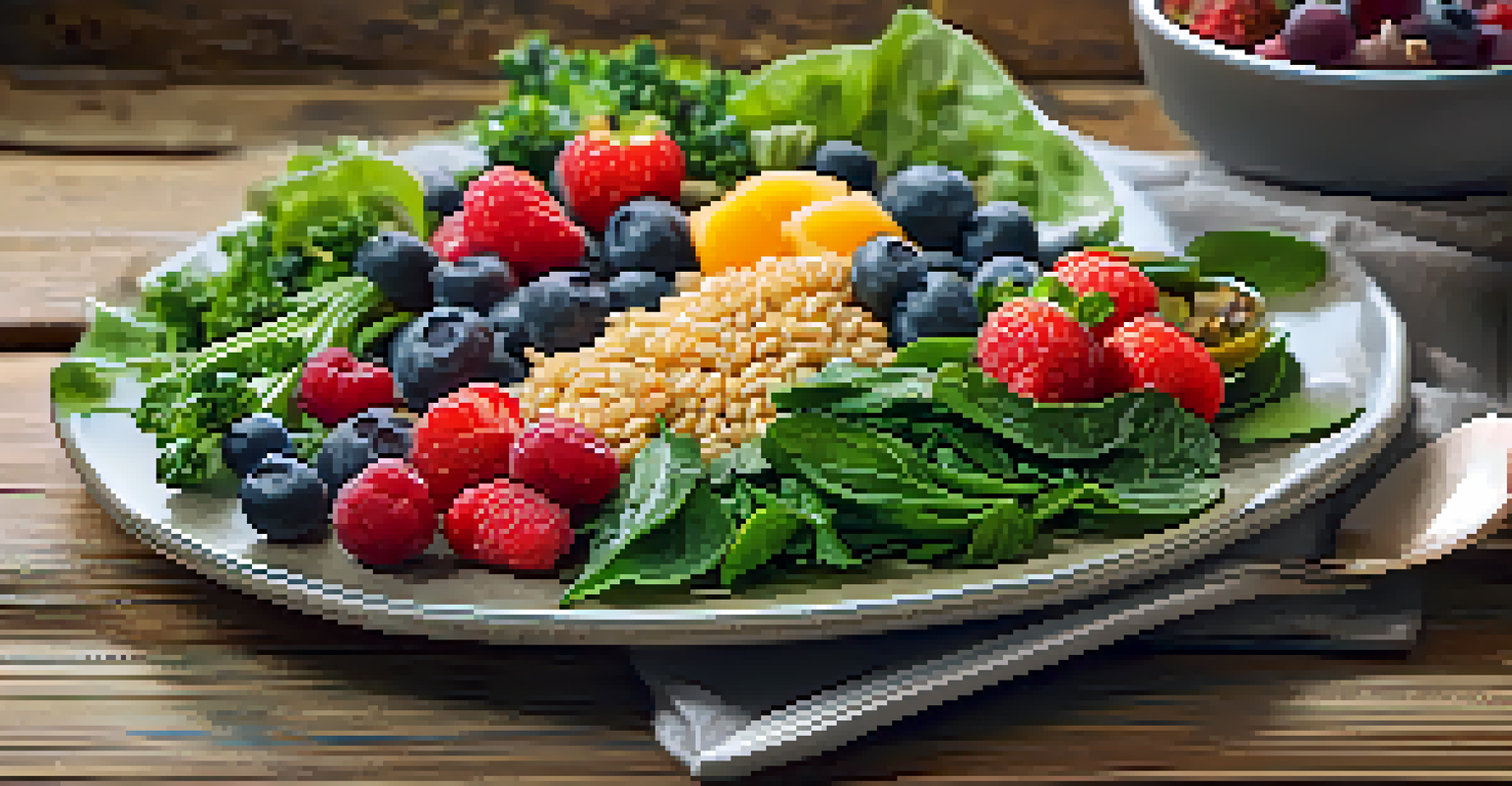Managing Chronic Kidney Disease Through Proper Nutrition

Understanding Chronic Kidney Disease and Its Impact
Chronic Kidney Disease (CKD) is a long-term condition where the kidneys gradually lose function. This can lead to a buildup of waste products in the body, which might cause serious complications. Understanding CKD is vital for effective management and lifestyle adjustments.
Let food be thy medicine and medicine be thy food.
The impact of CKD extends beyond the kidneys, affecting various body systems and overall health. Patients often experience symptoms such as fatigue, swelling, and changes in urination. Consequently, a holistic approach, including proper nutrition, becomes essential for maintaining quality of life.
Proper management of CKD can slow its progression and minimize symptoms. This is where nutrition plays a key role, as a well-balanced diet can support kidney health and enhance overall well-being.
The Role of Nutrition in Kidney Health
Nutrition is more than just food; it's a powerful tool in managing CKD. A well-planned diet can help control blood pressure, reduce the risk of heart disease, and maintain a healthy weight—all critical factors for kidney health. Understanding what to eat and what to avoid is key.

For instance, diets low in sodium can help manage blood pressure, while limiting phosphorus and potassium intake can prevent further kidney damage. This means carefully choosing foods and reading labels to make informed decisions.
CKD Impacts Overall Health
Chronic Kidney Disease affects not just kidney function but also various body systems, leading to symptoms that require a holistic management approach.
Moreover, consulting with a registered dietitian can provide personalized guidance. They can help tailor a nutrition plan that aligns with individual health needs and lifestyle preferences, making healthy eating attainable and enjoyable.
Key Nutritional Guidelines for CKD Patients
When managing CKD through nutrition, there are several key guidelines to follow. Firstly, it's crucial to control protein intake. While protein is essential for the body, excessive amounts can strain the kidneys, so moderation is vital.
The greatest wealth is health.
Additionally, focusing on whole foods like fruits, vegetables, and whole grains can provide essential nutrients without overwhelming the kidneys. Foods rich in omega-3 fatty acids, such as fish, are also beneficial for heart health.
Finally, staying hydrated is important, but it's equally crucial to monitor fluid intake based on individual needs and doctor's recommendations. Balancing hydration can help prevent dehydration while avoiding excess fluid retention.
Foods to Include in Your CKD Diet
Certain foods can offer significant benefits for those managing CKD. For example, berries, apples, and grapes are excellent choices due to their high antioxidant content and low potassium levels. These fruits can help combat oxidative stress and inflammation.
Leafy greens like spinach and kale are also great additions, providing essential vitamins and minerals without overloading the kidneys. Similarly, whole grains like brown rice and quinoa can offer necessary fiber while keeping protein levels in check.
Nutrition is Key for CKD Management
A well-planned diet plays a crucial role in managing CKD by controlling blood pressure, maintaining a healthy weight, and preventing further kidney damage.
Incorporating healthy fats from sources like olive oil and avocados can further support heart health, which is vital for CKD patients. By focusing on these nutrient-dense foods, individuals can create a balanced diet that promotes kidney health.
Foods to Avoid with Chronic Kidney Disease
While it's important to know what to include in your diet, it's equally crucial to understand which foods to limit or avoid. High-sodium foods, such as processed snacks and fast food, can elevate blood pressure, putting additional strain on the kidneys.
Additionally, foods that are high in phosphorus, like certain dairy products and dark sodas, should be limited as they can contribute to bone disease and cardiovascular issues. Monitoring potassium intake is also vital, as excessive levels can lead to serious heart complications.
Lastly, sugary foods and beverages can lead to weight gain and increased blood sugar levels, further complicating CKD management. Being mindful of these foods can empower patients to make healthier choices.
The Importance of Portion Control
Portion control is a significant aspect of managing chronic kidney disease through nutrition. It's easy to consume more than the recommended serving sizes, which can lead to excess intake of sodium, potassium, or phosphorus. Learning to recognize appropriate portion sizes can help maintain a balanced diet.
Using measuring cups or a kitchen scale can be helpful tools for ensuring accurate portions. Additionally, visual cues, such as comparing serving sizes to everyday objects, can aid in making better choices.
Portion Control Enhances Diet Success
Practicing portion control is essential for CKD patients to maintain balanced nutrient intake and promote mindful eating habits.
Practicing portion control not only helps in managing nutrient intake but also encourages mindful eating, which can enhance the overall dining experience.
Creating a Sustainable Meal Plan for CKD
Developing a sustainable meal plan for managing CKD involves more than just dietary restrictions; it's about creating a lifestyle you can maintain. Start by incorporating a variety of foods that you enjoy, ensuring that your meals are not only nutritious but also pleasurable.
Planning meals ahead of time can simplify grocery shopping and cooking. Batch cooking and freezing portions can save time and ensure you always have healthy options on hand, reducing the temptation to opt for unhealthy fast food.

Lastly, being flexible with your meal plan allows for spontaneity while still adhering to nutritional guidelines. Remember, the goal is to create a sustainable and enjoyable way of eating that supports your kidney health.